There is a lot of confusion between the terms separation and divorce, but they are not interchangeable. Both of them have different processes, implications, and much more.
However, one thing to keep in mind is that there might be a chance of automatic divorce after long separation in Canada.
But remember that not all separations will lead to an automatic divorce. There are certain conditions you must fulfill to be eligible for one.
So, if you want to learn more about automatic divorce in Canada, you have come to the right place. We have created a complete guide for you to understand these concepts.
Separation vs. Divorce: Understanding the Difference
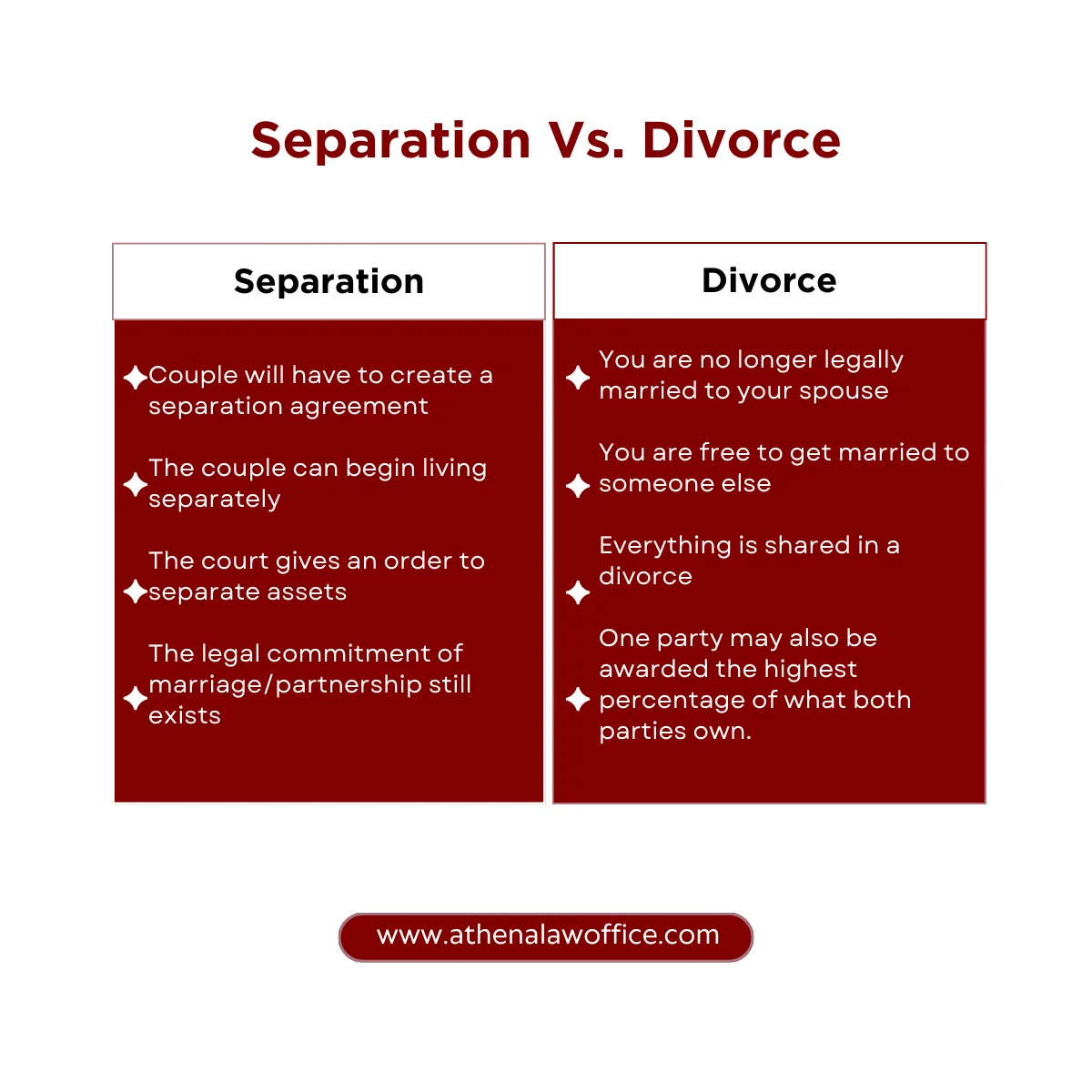
Separation takes place when you stop living with one another because of irreconcilable differences. But, a divorce is when you legally terminate your marriage with your spouse.
The legal process of divorce is extensive, and you will have to go to the court for a judge to grant you a divorce. On the other hand, you don’t have to go to court to separate.
Instead, you and your spouse can create a separation agreement with all the conditions to ensure peace of mind for both parties. You may still be married but living separately.
Law on Marriage Separation
You might want to familiarize yourself with the law of marriage separation. But, the truth is that the law varies by province, and you will have to check your specific jurisdiction for the law.
There are a few things all of these separation laws have in common, which include the following:
- Determining child custody
- Child support
- Spousal support
- Property and asset division
You can learn more about the key components of separation agreements in detail on our blog.
Separation Agreements Before Divorce: Are They Necessary?
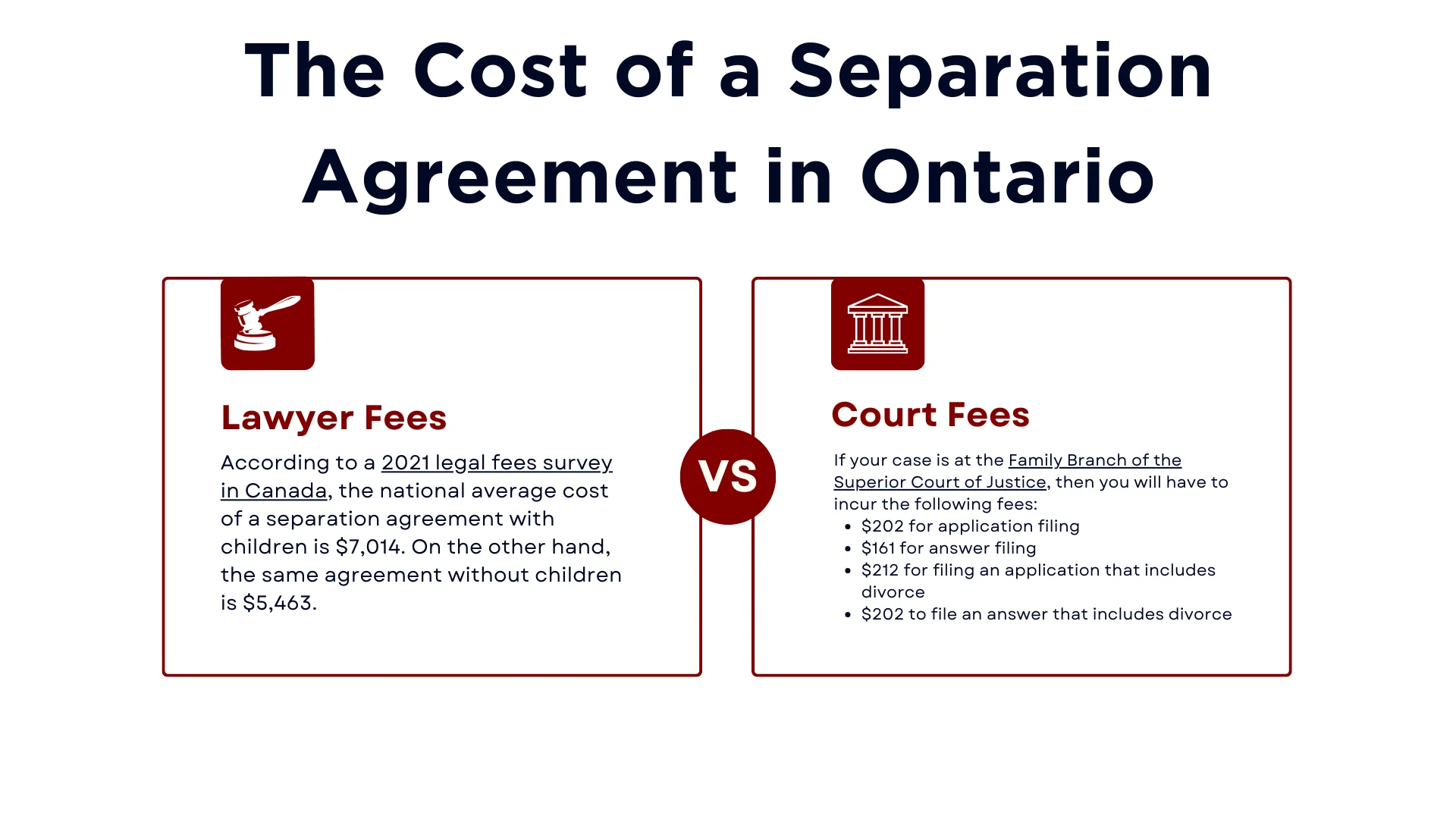
Even when you and your spouse are separated before an automatic divorce after long separation in Canada, you will have to create an agreement.
Such an agreement will be useful for settling various matters between you and your spouse. These include custody, support, property division, and more.
You can hire a divorce law attorney to clarify questions regarding separation and negotiate and create a fair separation agreement. Both parties will have to sign this agreement to ensure it can be enforceable.
What is Long Separation in Automatic Divorce?
Long separation in automatic divorce means you will have to be separated from your partner for a minimum of one year before you can apply for automatic divorce.
This long separation will be the basis for you to file an automatic divorce. Remember that there has to be no hope for reconciliation after this separation to apply for a divorce.
Is There an Automatic Divorce After Long Separation in Canada?
There is no way for you to get an automatic divorce after long separation in Canada unless you legally claim a divorce from the court.
Your marriage will have to be nullified by a court for it to be considered a divorce. After that, you can live your life on your terms.
Without receiving this divorce certificate, you will still be considered legally married, even if you are separated from your spouse.
Eligibility Criteria for Automatic Divorce After Long Separation in Canada
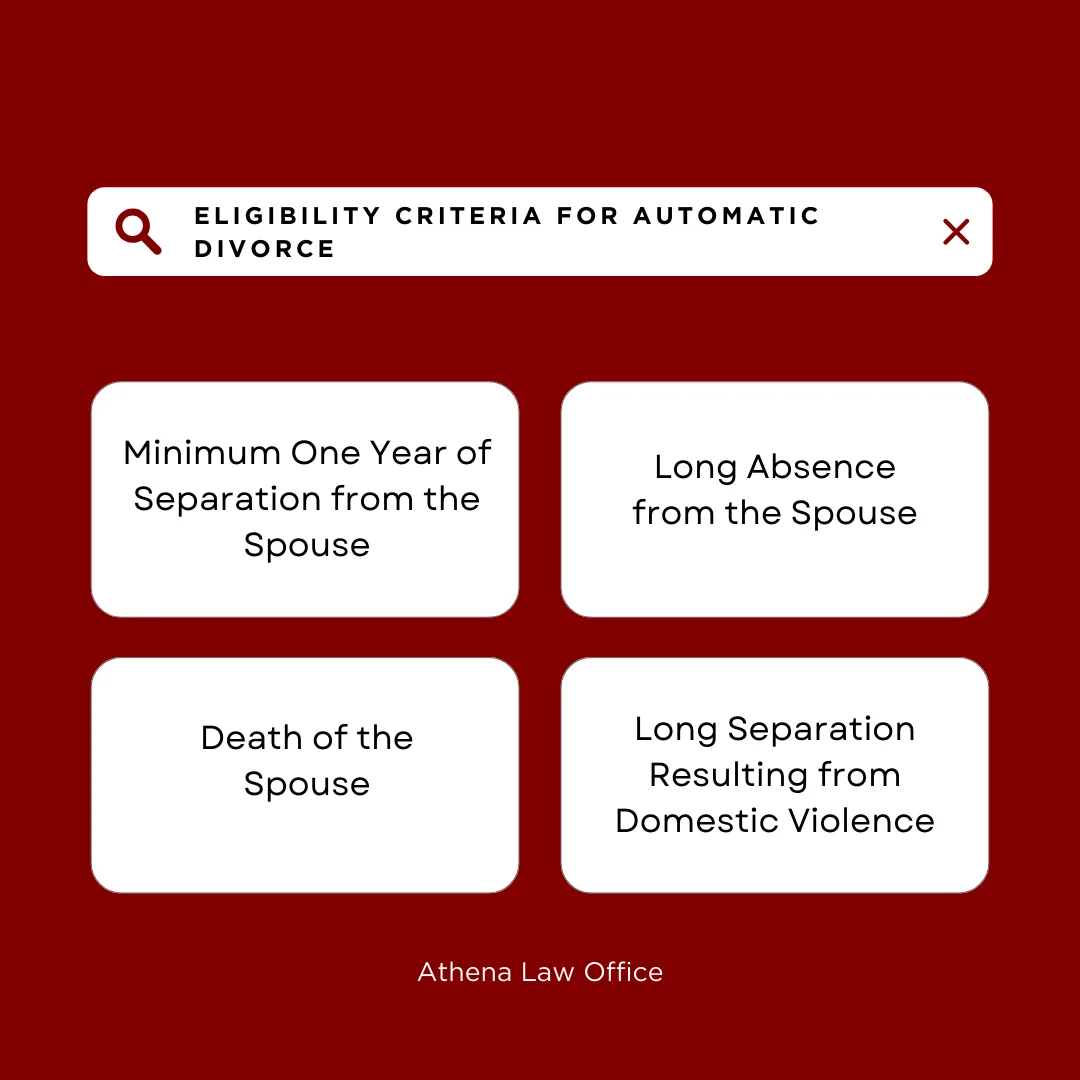
Now that you understand some basic tenets of automatic divorce after long separation in Canada, it is also crucial to understand the grounds that will lead to this divorce.
You and your spouse must fulfill this eligibility criteria to file for an automatic divorce with the courts. These include the following:
1. Minimum One Year of Separation from the Spouse
No maximum thresholds exist for how long you must be separated for an automatic divorce. However, the minimum separation period is one year to claim an automatic divorce from the courts.
You must prove to the court that you have been living apart for a year.
Remember that if you and your spouse get back together for more than ninety days during this time, then the clock will restart.
Other than that, you will have to prove to the courts that you and your spouse were separated for 365 consecutive days. You can prove it through the following methods:
- Statements from witnesses affirming this fact
- Documents showing that you and your spouse were living apart
- Any other proof that your spouse has been absent from your life for a year or more
Once you prove this separation, you can file for automatic divorce after long separation in Canada.
2. Death of the Spouse
The death of your spouse will lead to an automatic divorce. If your partner is absent or has been hospitalized because of a severe injury or mental disorder, then you will have to file for a rightful divorce with the courts.
In such a case, you can use the separation to claim a rightful divorce.
3. Long Separation Resulting from Domestic Violence
Domestic violence is an incredibly difficult situation to deal with. If domestic violence takes place, then the spouse can begin living separation.
Later on, domestic violence will be the grounds for an automatic divorce after long separation in Canada. We recommend you consult a lawyer when domestic violence is involved in a separation or divorce case.
A family lawyer in Canada will ensure you get rightful compensation, and the process is easier for you. For more information, you can get in touch with our practice.
The Application Process of Automatic Divorce after Long Separation in Canada

If you want an automatic divorce after long separation in Canada, you must fulfill the divorce application process with the necessary documents.
We have broken down the entire process to help you file for automatic divorce accurately:
Step 1: Fulfill the Separation Period Conditions
The first step you must take is to separate from your partner for at least a year. You can begin organizing your life independently and resolve other important matters through a separation agreement.
Step 2: Complete & Sign Divorce Application Forms
After fulfilling the separation period, you have to file for an automatic divorce with the court. You and your spouse must complete and sign the application forms for your divorce.
If you have children, you will need to fill out additional forms related to child custody, support, and other relevant matters.
Step 3: File the Application in the Family Court
Once you have completed and signed the divorce application forms, it is time to file them with the relevant family court in your jurisdiction.
Remember that there might be a fee associated with applying. It is best to check with the court to determine how much you and your spouse will have to pay.
Step 4: Time to Wait
There is a waiting period before your application is reviewed and your divorce is finalized. During this time, objections to the divorce are allowed.
If you have any concerns, it is best to raise them during this time to ensure they are taken into account.
Step 5: The Court Will Issue a Divorce Certificate
After the waiting period is over, the family court will issue a Divorce Certificate and/or Divorce Order. The document will state that your marriage is legally and officially over.
How Long Does it Take to Divorce in Canada: The Timeline
Every case is unique, which is why the timeline will also vary, depending on your case. As a general rule, an uncontested divorce processing time is between four and six months.
On the other hand, the contested divorce processing time is twelve months or more. The more complex your case is, the longer it will take for you to get divorced.
Can a Judge Refuse Divorce After Long Separation?
Yes, there are cases where the judge will refuse an automatic divorce after long separation in Canada. These are some of the circumstances when this can take place:
- If your child is not receiving the necessary financial support they require
- When the claim for the divorce is cruelty or adultery. In such cases, the judge will pause the case as they will require solid evidence that this took place. The process will continue after you have provided evidence
- If the judge has reason to believe that you and your spouse want to divorce one another to gain some personal benefits, then they might refuse divorce
These are the top three circumstances where the judge will refuse automatic divorce after long separation in Canada. Be sure to fulfill all conditions so that a judge doesn’t refuse your divorce proceedings.
Automatic vs. Rightful Divorce: The Differences
There are many types of different divorces you can go through. However, the two main types are automatic divorce and rightful divorce.
Here are the differences between the two types of divorce to help you understand them better:
| Differences | Automatic Divorce | Rightful Divorce |
| What it is | It occurs without mutual consent or agreement. | Both parties mutually consent to this type of divorce. |
| Grounds | You don’t need any specific grounds for automatic divorce, as it is granted without assigning blame. | You have to meet specific grounds to file for a rightful divorce. These include cruelty, adultery, etc. |
| Legal proceedings | It is a quick process and takes only a few months. | The process can be complex and may take longer due to processing time, negotiations, and more. |
| Asset division | It is determined by the prenup agreement or the rules based on the jurisdiction. | Division happens through the process of negotiations |
Top 3 Alternatives to Automatic Divorce After Long Separation in Canada
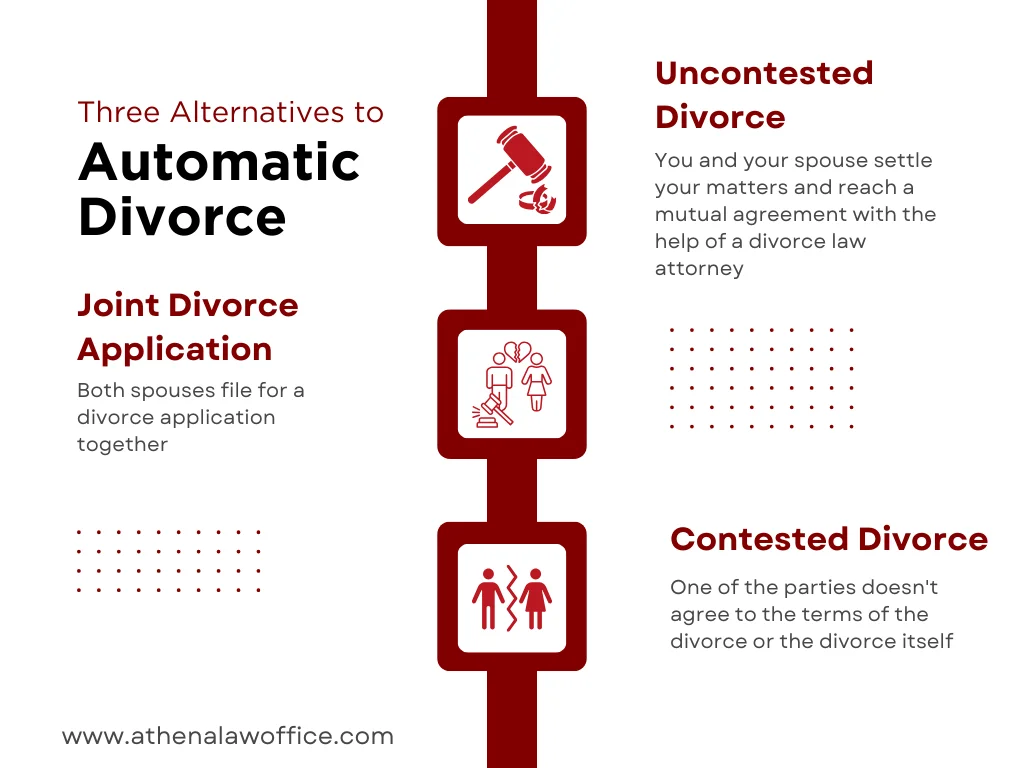
Now that you have some basic knowledge about automatic divorce after long separation in Canada, you might want some other options, too. There are three alternatives to an automatic divorce in Canada.
Please note that annulment is not an alternative to divorce. Instead, it is a separate type of marriage termination. You can learn more about annulment vs. divorce on our blog.
These include the following:
Alternative 1: Uncontested Divorce
Another option you have at your disposal is uncontested divorce. This happens outside of court as you and your spouse settle your matters and reach a mutual agreement with the help of a divorce law attorney.
After you have agreed to the terms, you submit the application to a judge for divorce approval. Many people find this option to be less time-consuming and costly.
But keep in mind that this route doesn’t apply to all couples, especially if one party wants a divorce and the other doesn’t.
Alternative 2: Joint Divorce Application
A joint divorce application is when both spouses file for a divorce application together. The application indicates that both parties have reached an agreement regarding the divorce terms.
Such an option can be much faster and less costly than other methods. However, you will still need to go through a court hearing to approve your application.
Alternative 3: Contested Divorce
A contested divorce is when one of the parties doesn’t agree to the terms of the divorce or the divorce itself. In this case, the couple will have to go to court for a hearing to resolve their issues.
Contested divorce is perhaps the most time-consuming and costly alternative available to couples. However, it becomes a necessity when the spouses can’t seem to reach an agreement about their divorce terms.
FAQs
How many years do you have to be separated to be legally divorced in Canada?
One year is the minimum requirement for separation in Canada before you can file for a divorce. You must prove that you have been living apart for a year to apply for automatic divorce.
Is there automatic divorce in Canada?
Yes, you have to meet the following criteria to be eligible for an automatic divorce in Canada:
- Separation period of at least one year
- Spouse death
- Permanent separation from the spouse
- Long separation resulting from domestic violence
Can you get a divorce without the other person signing in Canada?
If the other person is not signing the divorce papers in Canada, then you will need to prove the breakdown of the marriage and meet certain conditions before the court grants you a divorce.
How do you deal with an unexpected divorce?
It is crucial to take care of yourself physically and emotionally when you are dealing with an unexpected divorce. We also recommend hiring a divorce law attorney to help you through this process and ease your legal burdens.
Final Thoughts
That was everything you needed to know about automatic divorce after long separation in Canada. If you want a divorce from your spouse, you must fulfill the condition of being separated for at least a year before you claim divorce from the courts.
If you require assistance during this process, be sure to contact a family lawyer in Canada. It will make the process easier and ensure you meet all legal requirements.
Author Profile

- Barnett Law is a trusted and knowledgeable lawyer in Scarborough. Her expertise spans real estate law, family law, adoptions and fertility law. A lawyer by profession and a humanitarian by heart, Athena Narsingh Barnett wants to help people become more familiar with the legal system and be well-informed to make important legal decisions.
Latest entries
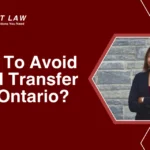 legal guidanceNovember 12, 2025How To Avoid Land Transfer Tax Ontario?
legal guidanceNovember 12, 2025How To Avoid Land Transfer Tax Ontario?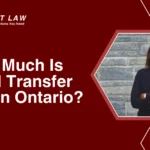 legal guidanceOctober 31, 2025How Much Is Land Transfer Tax In Ontario?
legal guidanceOctober 31, 2025How Much Is Land Transfer Tax In Ontario? Family LawOctober 27, 2025How Much Does A Divorce Cost In Ontario In 2025?
Family LawOctober 27, 2025How Much Does A Divorce Cost In Ontario In 2025?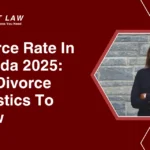 Family LawOctober 22, 2025Divorce Rate In Canada 2025: Top Divorce Statistics To Know
Family LawOctober 22, 2025Divorce Rate In Canada 2025: Top Divorce Statistics To Know

